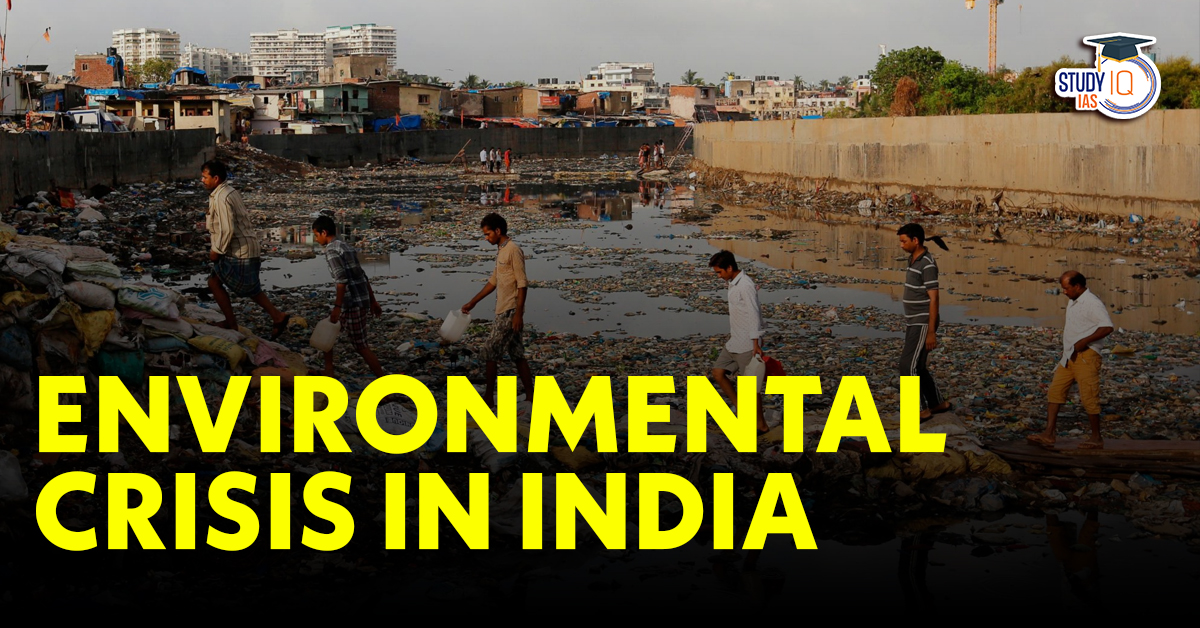Table of Contents
Context: World Environment Day (June 5) urges reflection on worsening ecological issues. Over the past decade, global and Indian environmental crises—carbon emissions, biodiversity loss, and pollution—have escalated despite growing awareness.
Environmental Crisis in India
- Rising Carbon Emissions: India’s CO₂ emissions rose from 2.33 billion tonnes (2015) to 3.12 billion tonnes (2024).
- Coal still powers nearly 70% of electricity generation.
- Severe Air Pollution: India ranks among the world’s most polluted countries.
- Delhi consistently tops global air pollution charts.
- Biodiversity Loss: Deforestation, wetland loss, and monoculture agriculture threaten India’s status as a megadiverse nation.
- Habitat fragmentation is accelerating species extinction.
- Water and Soil Pollution: Rivers like the Ganga and Yamuna are heavily contaminated by industrial effluents and sewage.
- Soil health is declining due to the overuse of chemical fertilisers and pesticides.
- Waste Mismanagement: India generates 62 million tonnes of solid waste yearly; only 20% is scientifically treated.
- Climate Extremes: Increasing frequency of heatwaves, erratic monsoons, floods, and droughts exacerbate social and economic vulnerabilities.
Root Causes of Environmental Crises
- Fossil Fuel Dependence: Coal, oil, and gas dominate the energy and transport sectors.
- Deforestation and Land Use Change: Forest clearances for infrastructure and mining threaten critical ecosystems like the Western Ghats and the northeast.
- Unsustainable Agriculture: High-input, monoculture farming leads to habitat destruction and chemical pollution.
- Urbanisation and Waste: Rapid, unregulated urban growth results in untreated sewage, plastic accumulation, and growing landfill sites.
- Industrialisation and Overconsumption: High consumption patterns in developed countries externalise environmental costs to developing nations like India.
Solutions and Way Forward
- Global North Responsibility: Rich nations must cut emissions, fund climate resilience, and reduce carbon outsourcing to the Global South.
- Corporate Accountability: Enforce green compliance, carbon taxes, and penalise polluters.
- Sustainable Development Pathways: Promote low-carbon jobs, circular economy models, and green infrastructure.
- Ecological Agriculture: Encourage biodiversity-based farming systems and reduce agrochemical dependency.
- Community-led Conservation: Empower local communities, especially tribal and rural populations, in protecting forests, water bodies, and biodiversity.
- Policy Integration: Embed ecological criteria in trade, investment, and industrial planning.


 Geological Heritage Sites of India: Sign...
Geological Heritage Sites of India: Sign...
 Wildlife Sanctuaries of India 2026: List...
Wildlife Sanctuaries of India 2026: List...
 National Parks in India 2026: Complete S...
National Parks in India 2026: Complete S...

























